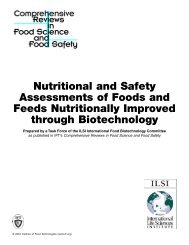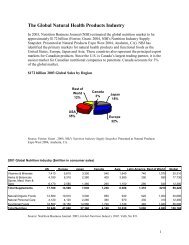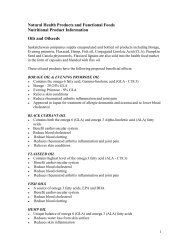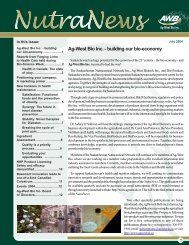Beyond Borders: Global biotechnology report 2010
Beyond Borders: Global biotechnology report 2010
Beyond Borders: Global biotechnology report 2010
You also want an ePaper? Increase the reach of your titles
YUMPU automatically turns print PDFs into web optimized ePapers that Google loves.
acquired US-based hybrid sorghum seed<br />
producer Crosbyton Seed Company<br />
to strengthen its position in the US<br />
sorghum market.<br />
In January <strong>2010</strong>, Transgene Biotek entered<br />
into a licensing and technology transfer<br />
agreement with Dr. Reddy’s Laboratories for<br />
manufacturing obesity-management drug<br />
Orlistat. Also in January, Saamya Biotech<br />
(India) Ltd. entered into a joint venture with<br />
Malaysian firm Perak Bio Corporation to set<br />
up a biopharmaceutical manufacturing unit<br />
in Malaysia.<br />
An increasing number of global<br />
<strong>biotechnology</strong> companies are eyeing India<br />
as an important destination for executing<br />
their cost-cutting measures in response<br />
to restrictive capital markets and the<br />
need to increase efficiency. There has<br />
been a significant spurt in deals involving<br />
outsourcing, technology transfer and entry<br />
of foreign players to tap a burgeoning<br />
Indian <strong>biotechnology</strong> market. Bristol-Myers<br />
Squibb and Biocon’s subsidiary Syngene<br />
announced the opening of their integrated<br />
drug discovery and development center at<br />
Biocon Park in March 2009. This 200,000<br />
square-foot facility will house around<br />
360 researchers and will span the drug<br />
discovery and development process from<br />
lead optimization up to Phase I and Phase<br />
II clinical studies. India’s leading contract<br />
research and manufacturing service<br />
(CRAMS) player, Jubilant Organosys,<br />
entered a contract research agreement<br />
with US-based Endo Pharmaceuticals to<br />
develop preclinical candidates for oncology.<br />
In September 2009, Biocon entered<br />
an agreement with US-based Amylin<br />
Pharmaceuticals to develop diabetes<br />
products. The company also entered a<br />
partnership with global generic drug maker<br />
Mylan to manufacture and commercialize<br />
several generic biotech drugs globally.<br />
Meanwhile, several European <strong>biotechnology</strong><br />
companies, such as Germany-based<br />
Biobase and UK-based Oxygen Healthcare,<br />
Crystec Pharma and Lena Nanoceutics,<br />
have announced plans to outsource their<br />
manufacturing through collaborations with<br />
Indian companies.<br />
Biosimilars: the next big opportunity<br />
Indian biopharmaceutical players have<br />
developed strong capabilities in the<br />
high-potential biosimilar space and have<br />
presence in almost all the biologics coming<br />
off patent. Companies such as Reliance<br />
Life Sciences, Biocon, Wockhardt, Shantha<br />
Biotech, Panacea Biotech and Intas<br />
Pharmaceuticals have been developing<br />
strong capabilities in this area. Biocon<br />
expects to bring its oral insulin to the US<br />
market by 2011 and has other biologics<br />
such as G-CSF and various monoclonal<br />
antibodies in its pipeline. Biocon is also<br />
expanding the application of its head and<br />
neck cancer monoclonal antibody, BIOMAb<br />
EGFR, and has launched cervical cancer<br />
clinical trials for this drug. Reliance Life<br />
Sciences recently launched its fourth<br />
biosimilar product, TPA Reteplase, in the<br />
domestic market and plans to launch three<br />
more products in <strong>2010</strong>. The company also<br />
has approximately nine biopharmaceutical<br />
products in preclinical and clinical<br />
development. Cipla formed a joint venture<br />
called Biomab with a Chinese company for<br />
manufacturing of biosimilars. Dr. Reddy’s,<br />
which has filgrastim (G-CSF) and rituximab<br />
in the market, claims to have a pipeline of<br />
eight generic biopharmaceuticals in various<br />
stages of development, including two in<br />
clinical development.<br />
Although Indian companies seem<br />
well-positioned, they will likely face strong<br />
competition from large cash-rich generics<br />
firms such as Teva Pharmaceuticals, Mylan<br />
and Sandoz. Moreover, taking biosimilar<br />
drugs into developed markets is likely to<br />
38 <strong>Beyond</strong> borders <strong>Global</strong> <strong>biotechnology</strong> <strong>report</strong> <strong>2010</strong><br />
involve strong regulatory challenges due to<br />
a potential requirement for submitting noninferiority<br />
clinical trial data — which could<br />
require large expenditures. In addition,<br />
strong marketing clout will be required to<br />
effectively compete with large numbers of<br />
biosimilar brands. As such, it is likely that<br />
Indian companies will partner with larger<br />
players to navigate these challenges.<br />
Outlook: the opportunities ahead<br />
In recent years, the Indian biotech sector<br />
has been gradually transforming from<br />
fee-for-service provider to a strategic partner<br />
for the global <strong>biotechnology</strong> industry — a<br />
trend that continues with some significant<br />
recent deals between Western and Indian<br />
companies. As Western companies recover<br />
from the financial crisis and focus on<br />
opportunities in newer geographies and cost<br />
optimization, we could see more acquisitions<br />
of Indian <strong>biotechnology</strong> companies,<br />
particularly those in niche segments or<br />
having specialized innovative and/or<br />
manufacturing capabilities.<br />
Still, challenges remain. The industry<br />
urgently needs a streamlined regulatory<br />
structure to continue to attract investments<br />
from foreign companies. To move up<br />
the value chain, Indian companies will<br />
increasingly need to develop novel drugs — a<br />
challenge because of the lack of sufficient<br />
venture capital.<br />
The Indian <strong>biotechnology</strong> industry has<br />
come a long way and continues to grow<br />
even amid the global downturn as Western<br />
companies seek opportunities to lower<br />
costs and boost R&D efficiency. But to seize<br />
the next wave of opportunities — from the<br />
evolving biosimilars space to establishing a<br />
presence in developing novel drugs — Indian<br />
companies, investors and policy-makers will<br />
need to focus on addressing some of the<br />
critical challenges identified above.








